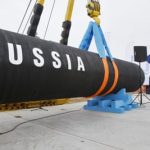
British and European gas prices both hit record highs on Friday as the war in Ukraine continued to wreak havoc on energy markets, threatening to exacerbate the cost of living crisis.
The UK National Balancing Point (NBP) benchmark soared above 500p a therm at one point, smashing through the previous all-time high set in December amid a prolonged surge that caused the collapse of a series of household gas suppliers.
The Dutch Title Transfer Facility for delivery in April, a common benchmark for European gas, hit €200 for the first time, before settling back later in the day.
Analysts warned that fresh rises could follow as energy traders digest the risks of disruption to pipelines in Ukraine, sanctions and cold weather expected later this month.
Sky-high gas prices have already forced Ofgem to increase the price cap on what household suppliers can charge, with the new maximum of £1,971 for a default dual-fuel tariff set to take effect in April.
The increase reflected a fourfold rise in energy market prices before Russia, the world’s second largest gas supplier, invaded Ukraine, the country through which many of its gas pipelines to Europe run.
Prices have surged again since the outbreak of war, prompting warnings that the cap on bills could rise to as much as £3,000 when Ofgem next sets the price cap, in October.
Russia supplies up to 40% of Europe’s gas, although the figure is below 4% for the UK.
“The market is trying to price both the likelihood and impact of a Russian flow cut, be it due to the conflict in Ukraine causing physical disruption to gas transit or due to a ramp-up in sanctions cutting flows all together,” said Tom Rodgers, European gas analyst at ICIS.
“The former could be compensated somewhat by Yamal [pipeline] flows, unless you lose all Ukrainian transit. While the latter remains a low likelihood event, that would be probably the largest ever change in European gas supply. This is on top on what was an already tight market.”
He warned that expected cold weather in north-western Europe could drive prices higher.


